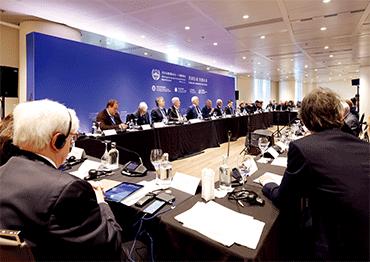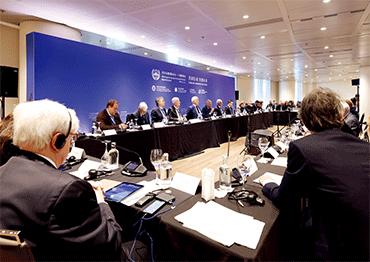In a world marked by “intertwined changes and turmoil, peace and development remain the shared aspirations of all peoples,” Chinese President Xi Jinping wrote in a congratulatory letter to the opening of the 2024 Imperial Springs International Forum (ISIF) held in Madrid, Spain from December 11 to 12, 2024.
China stands ready to work with other countries in the spirit of “promoting global solidarity,” upholding fairness and justice to safeguard global peace and stability, adhering to win-win cooperation to promote sustainable global development, and committing to inclusiveness and mutual learning to advance human civilization to new heights, Xi added.
Established in 2014, the ISIF is jointly organized by the Chinese People’s Association for Friendship with Foreign Countries, the Australia-China Friendship and Exchange Association, the provincial government of Guangdong, and the World Leadership Alliance-Club de Madrid, the world’s largest forum of former presidents and prime ministers.
Held annually in Guangzhou since 2014, except in 2020 and 2022 due to the Covid pandemic, the forum is a platform for China to conduct in-depth communication with the international community, with the aims of initiating substantive discussions on world peace, economic development and cultural exchanges to promote greater understanding and consensus among all parties.
The 2024 ISIF marks the forum’s first edition outside China, regarded as a symbolic move to strengthen the platform’s international influence.
According to Danilo Türk, president of the World Leadership Alliance-Club de Madrid and former president of Slovenia (2007-2012), a major reason to hold the ISIF in Madrid is because the Club de Madrid is headquartered there.
Türk said that having the ISIF in Madrid could strengthen communication between China and Europe, as well as among EU member states to find common solutions to global issues such as climate change. He said that the ISIF must proactively demonstrate China’s openness, otherwise the West will continue to perceive China through a simplistic and fearful lens. “Through open, inclusive and honest people-to-people exchanges, we aim to strengthen international cooperation and address challenges that we all share,” Türk said.
The theme of the 2024 ISIF is “Collective Action for One Future.” More than 200 participants from over 50 countries were in attendance, including over 50 former heads of state, heads of government and leaders of international organizations, and over 90 internationally renowned experts, scholars and business leaders.
Officials from the Chinese and Spanish governments also participated. Diego Martinez Belio, state secretary for foreign and global affairs of Spain’s Ministry of Foreign Affairs, European Union and Cooperation, noted in a speech that the forum has been a vital platform for fostering inclusive dialogue to address pressing global challenges since its first edition.
Hu Chunhua, vice chairman of the National Committee of the Chinese People’s Political Consultative Conference (CPPCC), China’s top political advisory body, attended the opening ceremony. Amid accelerating global changes unseen in a century, China will remain a champion of peace, stability and progress, while promoting high-level opening-up, Hu said.
The two-day event featured various activities such as a plenary discussion and parallel forums. Many participants called for a truly multilateral system in global governance.
Han Seung-soo, former prime minister of South Korea (2008-2009), warned that multilateralism, which has driven global peace and economic growth to unparalleled heights since World War II, is under “unprecedented” strain, which he said was one of the world’s most important challenges.
Csaba Korosi, a Hungarian diplomat who served as president of the UN General Assembly (2022-2023), agreed with Han. “Unfortunately, now the zero-sum mentality from geopolitical crises overshadows the necessity of global cooperation on common goods,” warned Korosi, adding that “the world needs well-functioning multilateralism now more than ever.”
Francisco Sagasti, former president of Peru (2020-2021), also shares this view. Highlighting the profound challenges that ongoing uncertainty, ambiguity and transformation have posed to governance at both national and global levels, Sagasti stressed that the world “needs to reach new governance arrangements at the regional and international levels to cope with the tremendous challenges of a fundamental change of epoch in human history.”
“When we consider the security challenges the world is facing, the ongoing conflicts, environmental crises, as well as issues of poverty and inequality – all of them require greater collaboration and collective action. They demand a strong and purpose-driven multilateral system, which is precisely what this forum aims to promote,” said Maria Fernanda Espinosa, former minister of foreign affairs of Ecuador (2007, 2017-2018).
According to Danilo Türk, as increasing clashes between different viewpoints of different countries are making it more difficult to identify and prioritize global actions, the world needs a stronger collective spirit to take common actions.
It is of no surprise that the growing influence of China in global governance was the most discussed topic during the forum. Türk stressed that China can and should take a greater role in promoting common actions, highlighting that China has attracted the participation of many countries globally with its Belt and Road Initiative.
Calling China a “constructive partner,” Espinosa, who also served as former president of the United Nations General Assembly (2018-2019), has followed climate negotiations for decades and attended COP29 in Baku, Azerbaijan in November 2024. She pointed out that on the issue of climate change, China is not only fulfilling its own commitments but also supporting developing countries to better adapt to the climate crisis and build resilience against it.
For Ismail Serageldin, former vice president of the World Bank (1992- 2000), the humanitarian crisis in Gaza and the use of veto power by the US to block ceasefire efforts by the UN Security Council that allowed Israel to continue its military actions has made it clear that the world needs to look to China in order to maintain international norms.
Mladen Ivanic, former president of Bosnia and Herzegovina (2014-2018), called for closer collaboration between the European Union and China. “As two key players, China and the EU have a responsibility to work together to bring stability to the world and demonstrate that cooperation between major powers is possible,” he said, “This stands in stark contrast to the notion we’ve recently heard from some other countries – that conflict will define our future – which is entirely misguided. Therefore, I am confident that China and the EU can join hands to bring stability to the world.”
Kjell Magne Bondevik, former prime minister of Norway (1997-2000, 2001- 2005), agreed. “China has made many contributions to Europe and other continents. We should collaborate in a positive atmosphere, where transparency is crucial,” he said, “We must be honest with each other and avoid hidden agendas. Openness toward one another is essential.”

 Old Version
Old Version
